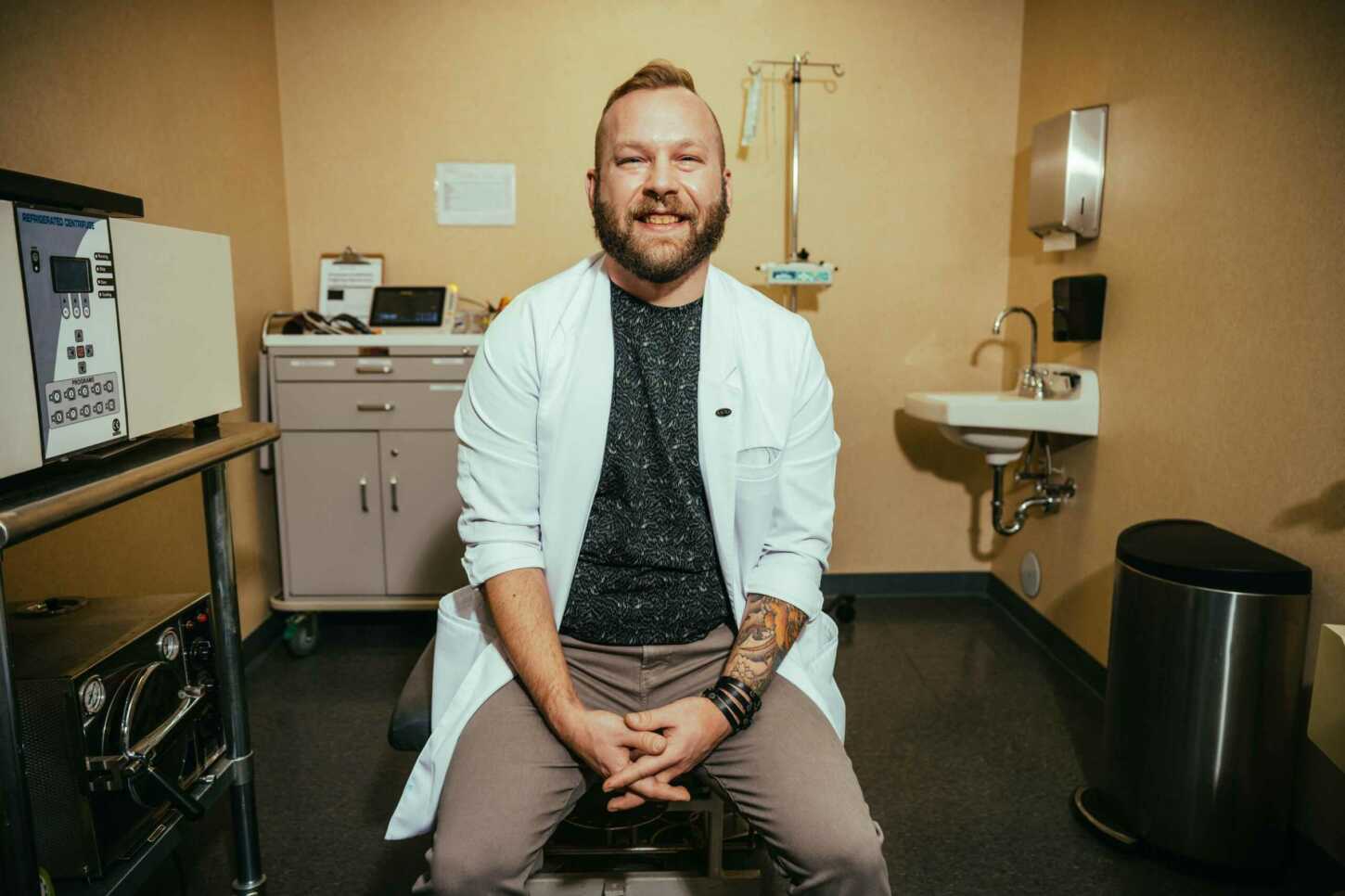The Michigan Nurse Who Played a Key Role in Keeping Mpox Cases to a Minimum
Be Well Clinic’s Chris Petrat on handling the first case in Michigan

When monkeypox (now officially termed “mpox” by the World Health Organization) first arrived in Michigan, Chris Petrat, clinical manager and nurse at Be Well Medical Center in Berkley, was prepared for whatever might be coming this way.
After all, he’d already been at the forefront of the state’s response to the COVID-19 pandemic. Before the first mpox case hit the clinic, which was the first official case in Michigan, he was working on how he’d help to get the word out to the community, line up vaccinations for the local population and had already tapped his extensive public health connection network.
In the end, Petrat’s role was integral to Michigan’s robust response to the influx of mpox across the MSM (men who have sex with men) community in Southeast Michigan. While we can’t know for sure, it seems likely, given the rapidity and reach of the response, that without Petrat and other people on the ground and proactive help from local health departments, the numbers might have pointed to a much more dire outcome.
Covid might have been fresh on the mind of Petrat and Be Well Clinic, but it was an earlier epidemic that came to mind as the news started trickling in, mostly focused on mpox cases among the MSM community. “Given what happened in the late ‘70s, early ‘80s, with the HIV/AIDS epidemic, we didn’t really want that to be a repeat,” he says. “Right away, we went in hard and heavy with the state, with local health directors of the health department.”
Petrat noticed a common early media narrative around mpox that framed the virus almost exclusively as an STI primarily impacting the LGBTQ+ community (and in particular, the gay and bisexual male community). “It was kind of a double-edged sword, in my opinion,” he says. “They brought awareness to the issue, but by generalizing it as though it’s an STI, now there’s more stigma. Anyone with skin can get this. It doesn’t matter your age, sexual orientation, gender identity. Skin is skin.”
Petrat says Be Well Clinic sees some patients who have been coming to the practice since the mid to late ‘80s, meaning they understand firsthand what it feels like to confront the kind of stigma that began to grow around mpox. He noticed they were feeling impacted by the news in negative ways. “I think that’s what pushed me so hard just to make sure that this was going to be dealt with quickly, rather than dragging our feet and waiting for it to become a lot worse.”
When the clinic was outed as the location of the first Michigan mpox case on record, Petrat recalls feeling a little alarmed, but immediately switching into nurse mode. “The first thing you do is you don’t panic — that’s just going to upset the patient,” he says, noting that the patient had recently traveled in areas that tracked with data Petrat had been following.
“We just kind of calmly walked out of the room and told him we’d contact the local health department about how we might screen him.” Two days later, the health department confirmed a positive result. “From there, things started to cascade,” he says. “We were seeing anywhere from two to three cases a week coming into the office — we were lucky to be in such close contact with the Oakland County Health Department that we actually had access to the antiviral for acute infection. It was just super nice to be able to get these people treated.”
“We’ve had no hospitalizations or deaths because we had access to treatment. So, it’s kind of hard to argue with that data. We know it’s effective
— it’s just kind of getting access to it can be a little cumbersome,” he says.

Petrat played a big part in solving the access issue. In fact, Southeast Michigan boasts one of the highest rates of mpox-vaccinated regions in the U.S. according to CDC data. Be Well Clinic alone has administered more than 1,200 mpox vaccines, and health department collaborations have helped get the vaccine into more than 13,000 arms across the state. The vaccines are highly effective — CDC data from July 31 - Oct. 1, 2022 shows that for every 1 illness among fully vaccinated people, there were 10 illnesses among unvaccinated people. To date, Michigan has seen around 400 positive cases.
Ultimately, though, mpox is not generally considered a deadly illness, though a small number of people globally have died from the virus. Some may ask why, then, the government and local agencies have dedicated funds and energy to slowing the spread. Compared with Covid, which has killed at least 40,000 Michiganders, mpox is an inconvenience, but is it really serious? As Pride Source reported last year, mpox is not an illness anyone wants to contract.
The lesions are not only unsightly, they can be excruciatingly painful — enough to send patients to hospitals for pain management. And they can appear virtually anywhere on the body, even in those harder-t0-reach places, which is a problem considering how unbearably itchy the rash can become. Even when patients are diagnosed and treated with antiviral medication, it can take weeks for the open wounds to heal. Then there are the chills, fever, fatigue, headaches, muscle aches and other typical viral symptoms. While sick, patients should be quarantined, but the stigma associated with mpox keeps many positive-testing people quiet, hiding their lesions under clothing.
As a healthcare professional, Petrat wants to reduce all this potential misery for as many people as he can. Prevention through vaccination is the best tool in his arsenal, and connecting people with vaccines through the well-connected Southeast Michigan health community has been the vehicle that has driven the initiative all along.
In addition to Be Well Clinic, Oakland County Health hosted numerous clinics throughout the county and Ferndale’s Affirmations was able to connect with the public in unlikely places like pop-up vaccine clinics outside popular venues. Oakland County Health Department, Petrat says, has a strong team and a great deal of passion for what they do. “I think rather than seeing this as a problem, they used it as an opportunity to creatively solve an issue,” he remarks.
As case counts grew and then eventually tapered off (only a few cases have been reported in recent weeks), Petrat kept in close contact with Kate Guzman, who serves in an administrative capacity at the county health department. That connection was a bridge between federal and state resources and healthcare workers. “They were very receptive — a lot of that probably was that the community is familiar with me, so it was like ‘Hey, we know this nurse, he’s part of the community and we’re all very comfortable with him.’ I think that helped us gain access to those vaccines as they became available.”
Petrat’s reputation may have preceded him, but it was his work on the ground that ultimately helped keep mpox from infecting more people in the community. “Chris single-handedly tackled vaccine outreach at social events every weekend,” Guzman says. “He is incredible and all too humble.”










